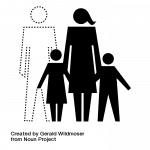
Contemporary thought is obsessed with power, deconstructing ideas, institutions, culture, and morality as nothing more than one group’s attempts to impose its power on other groups. Men, for example, are said to have more power than women and to exercise power over women, something feminists are battling and hope to change.
But there are different kinds of power and different realms of power, which complicate today’s simplistic power reductionism.
Swedish researchers conducted a study of Americans, asking them about their perceptions of who had more power, men or women, in various areas. They also asked which of these areas the subjects considered to be the most important.
Both men and women agreed that men had more power in the public dimension of life (the realm of work, politics, etc.). But both women and men agreed that women had more power in the private dimension of life (the realm of relationships, family, home life, etc.). And, significantly, both women and men agreed that the private dimension is more important than the public.
When they mathematically weighted the power factors and the relative importance assigned to them, the researchers found that the amount of power each gender had is identical.
You can read the study, published in the peer-reviewed journal PLOS One, at this link. The article is by Sverker Sikström, Laura Mai Stoinski, Kristina Karlsson, Lotta Stille, and Johan Willander and is entitled Weighting power by preference eliminates gender differences. From the Abstract (the bolds are mine):
Power can be applied in different domains (e.g., politics, work, romantic relationships, family etc.), however, we do not always reflect on which domains we have power in and how important power in these domains is. A dominant idea is that men have more power than women. This notion may be biased because the concept of power is associated with public life. . . .Together the studies suggest that men have more perceived power in the public domain, however, this domain has a lower preference weighting than the private domain where women have more power than men. Finally, when preferences for power in different domains were considered, no gender differences were observed. These results emphasize gender difference in different domains and may change how we perceive men’s and women’s power in our society.
A University of Lund statement about the research is entitled Men Feel Less Powerful in Their Private Lives, underscoring another implication of the study:
Men perceive themselves as having less power in their private than in their public lives, a new study from Lund University has suggested. Furthermore, both men and women agree: power in your private life matters more than that in public life.
The statement quotes the lead researcher, psychology professor Sverker Sikström (my bolds):
“The debate on gender equality tends to focus on topics in the public domain such as salaries, leadership in companies and politics, where women are underrepresented. However, our results influence how we should view power today. . . .
“It is difficult to maintain the position that men have more power than women, when women are perceived as having more power in the areas that are viewed as the most important. The case for equality also needs to be made in the private life, where men often lose custody cases, are more negatively affected by separations, and have weaker networks of friends. Thus, equality needs to be improved both for men and women, in both private and public life.”
Image by S. Hermann & F. Richter from Pixabay













